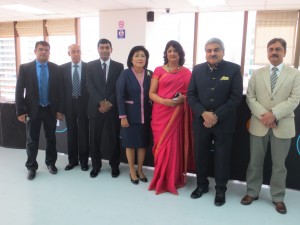
29 Jun, 2013
India Expects Lower Costs, More Efficiency as Bangkok Visa Office Changes Hands
Bangkok – The Indian Embassy’s outsourced visa processing contract for Thais and foreigners resident in Thailand has changed hands. Effective 8 July, it will be handled by IVS Global Services under a three-year contract, replacing the former processing agency VFS Global. This is the second contract that IVS has won in the last few months; the visa processing for the Indian High Commission in Sri Lanka will also be transferred to IVS as of September.
The Indian government’s outsourcing of visa processing and consular processing facilities worldwide is becoming a highly competitive revenue-generator for Indian private companies and their global partners/investors. In addition to IVS and VFS, three other companies — Cox & Kings Global Services, BLS International Services and Superb Enterprises — are providing the services globally and in India. VFS is linked to the Kuoni Group and IVS to the DBS Group, which is connected to Diners Club and runs seven business centers across India.

At the opening ceremony of the new IVS Global Services visa processing office in Bangkok on June 28: Indian Ambassador Anil Wadhwa, second from right; IVS Global Services CEO Mrs Venku Murthi, third right; Tourism Council of Thailand executive board member Mrs Somsong Suchaphimukh of SS Travels, fourth right; and other diplomats and executives.
In Thailand, VFS Global was charging applicants a processing fee of 60 baht per person. When the three-year contract came up for tender, IVS bid 20 baht, according to Indian embassy officials. The website of the outgoing VFS company indicated that Thai visa applicants pay a total of 1,830 baht for a tourist visa, non-refundable in case of rejection. After the handover, this amount will fall temporarily in line with the lower processing fee. The final amounts vary across different nationalities, types of visa and duration of stay required. All will be readjusted after October when the processing systems will be upgraded to a biometric mode, with finger-printing requirements.
The Indian government’s total net revenue from visa-processing fees worldwide has not been disclosed but is clearly very significant. The figure should be easily available via the Freedom of Information process or a question in Parliament.
Indian Ambassador to Thailand Mr Anil Wadhwa told guests at the opening ceremony of the new premises, “I hope that IVS Thailand will provide better services to the satisfaction of the applicants and Embassy. I expect IVS to implement a feedback system from customers to improve services and address their grievances in a timely manner.” He added, “Our aim is to provide faster, efficient and courteous service to you at all times.”
One apparent improvement is a facility to ensure photocopying of documents and availability of right-size photographs to accompany the application. To help applicants save valuable time and make minor adjustments in completing inadequate paperwork, IVS will have the facilities on hand, but these will be a value-added service and chargeable.
Other services will be largely the same as those offered by VFS – online applications, tracking numbers, SMS notifications, 72-hour turnaround times for routine tourist visas. Referring to it as a one-stop-shop, IVS Global Services CEO Mrs Venku Murthi said that if the paperwork is all complete, waiting time per applicant should not average more than 30-35 minutes.
Embassy officials said that in the low season, applications run between 190 to 220 per day, rising to between 500 – 700 in the high season.
In his statement, Ambassador Wadhwa said the embassy had handled more than 88,000 visas and 2,900 passports in 2012. He stressed the importance of a smooth visa application process within the overall context of the policy to narrow a huge imbalance in travel & tourism flows between Thailand and India. More than one million Indians are visiting Thailand but fewer than 100,000 Thais are visiting India, a number that is projected to increase robustly should the Thai baht continue strengthening against the rupee, now nearing the 1:2 parity level.
The Ambassador noted that India was making a major effort to promote Buddhist traffic. Monks and pilgrims have been given gratis visas since 1993, he said.
He said that during the visit of the Indian Prime Minister Dr Manmohan Singh to Bangkok in May 2013, it had been agreed to provide fast-track business visa services to qualified entrepreneurs in order to promote bilateral trade and investment. Details of this are to be finalised “in the coming weeks,” he said.
There are already 150+ flights between the two countries. Although most are between the key gateways, an emerging second generation of flights is linking secondary cities, such as Bangkok-Ahmedabad and Delhi-Phuket. The Ambassador voiced hope that tour operators will work with airlines to start flights on new sectors such as Guwahati, Vishakhapatnam, Agra, Jaipur, Trivandrum, Cochin, Bengaluru and Mangalore.
The Ambassador later told this editor that he expected Thais to be included on India’s list of nationalities eligible for visa-on-arrival at the four major Indian gateway airports by the end of 2013, perhaps as early as October. Embassy officials said this would not have much of an impact on the numbers being processed by IVS Global as there would be very strict criteria for the VoA.
IVS Global Services was set up by the late Sidharth Bhandari, son of Romesh Bhandari, a former Indian Foreign Secretary who also served as Ambassador to Bangkok between 1971-74. The company’s present managing director is Mr Sidharth’s son, Kaviraj, who is based in Mumbai. Sidharth Bhandari is also credited with launching the Diners Club charge-card in India.



Liked this article? Share it!